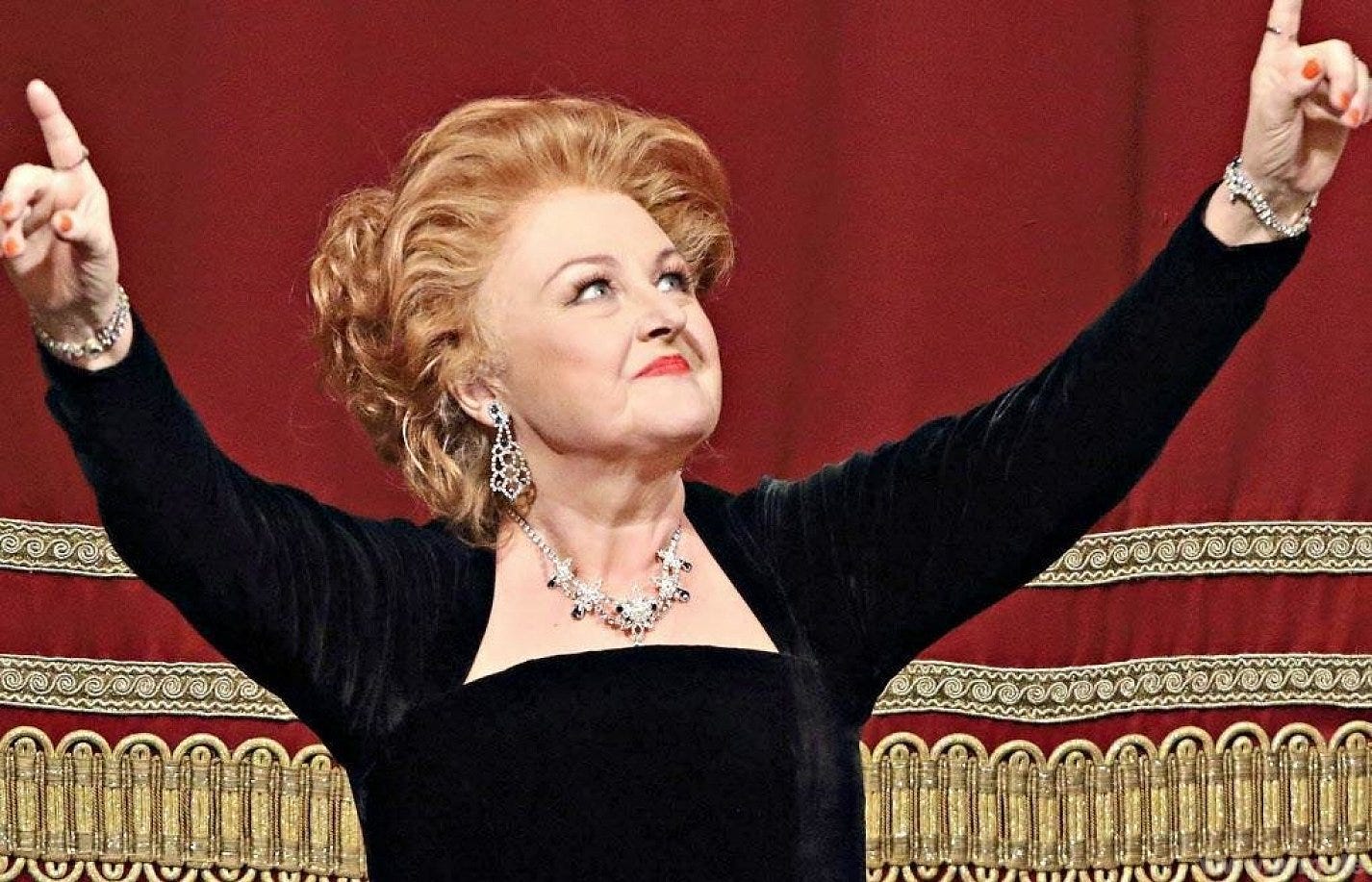Opera Daily 🎶 — The Queen of Coloraturas
Welcome to the weekly edition of Opera Daily, the best opera community on the internet. A reminder that you can check out the complete Opera Daily archives and the playlist on YouTube for more selections.
Hello friends,
When we lose someone, their absence makes us reflect upon their significance.
This week the world lost an incredible artist and person, Slovak coloratura soprano, Edita Gruberová. Such a long career for a far too short life.
We’re going to celebrate Edita Gruberová’s today by sharing two roles that she became known for over her long 40+ year career: Zebinetta in Ariadne auf Naxos by Richard Strauss and Konstanze in The Abduction from the Seraglio by Mozart.
I am not sure how to convey how challenging these roles are. They are brutal—the Ironman of singing. Off the charts when it comes to the need for endurance, speed, strength, agility, and skill.
This week I found myself looking back at her performances in amazement. She had no fear. It was clear that she committed everything she had to every performance. She was a giant of the craft of singing.
While her vocal tone was never a model of warmth, my admiration for her came less from the beauty of her voice and more from her mastery of it.
Gruberová’s singing reminds me of that saying in sports to “leave it all on the field.” Hold nothing back, put it all on the line. Don’t end the game feeling like you could have given more.
If you give everything, there will be no questions about what you could or might have done. Like Gruberová did on the stage.
That’s the way I want to end each day. How about you?
Zerbinetta, Ariadne auf Naxos by Richard Strauss
She performed the role of Zerbinetta more than 200 times across 36 years, 100 of these were in Vienna — her first in 1973 and her last in 2009.
This is a beast of an aria. It's amazing how easy she makes it sound.
“Großmächtige Prinzessin” (“Oh great princess”)
What is the context?
Zerbinetta decides to try once more to overcome Ariadne’s despair. She speaks with her directly, saying that a woman must take responsibility for her own life and cannot be expected to remain faithful to one man for her entire life. She describes her romantic adventures, going through lists of names of men she enjoyed and how she let them seduce her.
🎧 Listening Example (11 minute listen): Slovak coloratura soprano, Edita Gruberová in a 1978 Vienna of Ariadne auf Naxos sang Zerbinetta. The soundtrack was pre-recorded, but still worth a listen (Conductor, Karl Böhm)
Konstanze, Die Entführung aus dem Serail (The Abduction from the Seraglio) by Wolfgang Amadeus Mozart
“Ach ich liebte” (“Ah, I was in love”)
What is the context?
The Pasha finds Konstanze weeping and asks her why she is sad. She responds with this aria, saying that she once was in love and happy, but now she has lost that joy because she is separated from her love and is now in complete misery.
🎧 Listening Example (6 minute listen): Slovak coloratura soprano, Edita Gruberová singing “Ach ich liebte” from Act 1 of the German opera Die Entführung aus dem Serail by Wolfgang Amadeus Mozart
“Martern aller Arten” (“Tortures of every kind…may await me”)
What is the context?
Selim demands that Konstanze love him or suffer torture. Inspired by Blondchen, Konstanze declared that she would never be unfaithful even though it meant that she would be tortured and even suffer death. If he releases his demands on her, though, heaven will forgive him.
🎧 Listening Example (10 minute listen): Slovak coloratura soprano, Edita Gruberová singing “Martern aller Arten” from Act 2 of the German opera Die Entführung aus dem Serail by Wolfgang Amadeus Mozart. Bayerische Staatsoper, München, 1980 (Conductor, Karl Böhm)
“Martern aller Arten” lyrics, English translation
Tortures of every kind
May await me,
I scorn agony and pain.
Nothing will shake me,
Only one thing might make me tremble:
If I were to be unfaithful.
I implore you,
Spare me!
The blessings of heaven
Shall be your reward.
But you are determined.
Willingly, unflinchingly
I choose every pain and grief.
Well then, command, coerce me,
Roar, fulminate, rage,
Death will liberate me in the end.
Do you have a favorite Edita Gruberová role, recording or memory? Please share in the comments!
Thank you for reading (and listening),
Michele
❤️ If you enjoyed this selection, hit the heart to like it. It helps others find Opera Daily.



The amazing legacy of Gruberova that she grew into LUCIA from her amazing recording and other heavier roles. She sang NORMA late in her career when she was ready. I remember when Sills sang it in Newark at Symphony Hall stretching her voice; not good. Gruberova had few and far between engagements at The (da) Met. Our loss as always.
Was just emailing with another member who made me think of this clip of her singing Beatrice di Tenda by Bellini...she struggles with the high notes at the end, but that's the thing I love about her...she goes for it, commits, always (even if she misses) - she has no fear. I marked an incredible moment below (2:42)
https://www.youtube.com/watch?v=0ThWLhAonic&t=162s